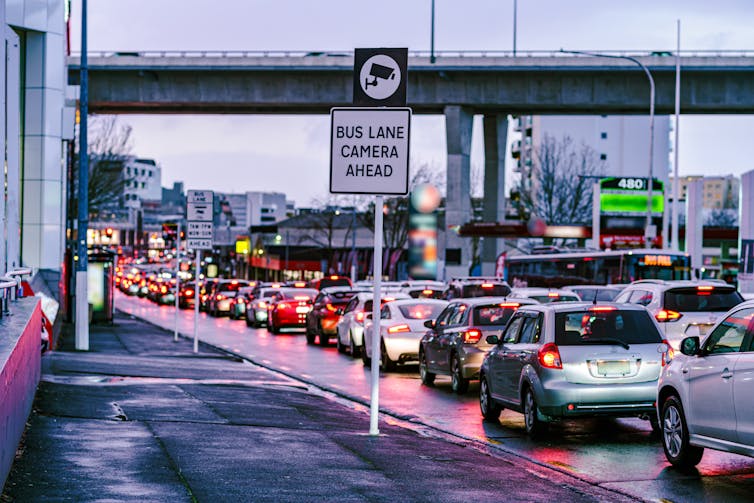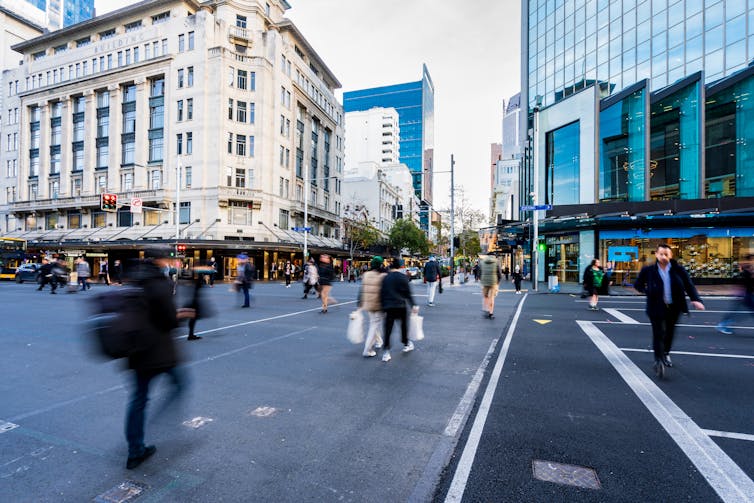With walking and cycling funding halved in the government’s recently released National Land Transport Programme, and a weaker transport emissions reduction plan, the potential health benefits of a low-carbon transport system have hit a real speed bump.
This is a pity, because one of the great promises of low-carbon transport is the health improvements that can accompany certain policy choices. Health is tangible, while decarbonisation policy is often complex and highly technical. People care deeply about health, both physical and mental.
However, we are now faced with climate and transport policy options that will have radically different implications for health.
To explore this, we looked at two distinct future transport pathways described by the Climate Change Commission. We found the choices New Zealand makes now will be crucial to improving people’s lives in the near future.
Transport and health
We already know transport systems cause a lot of disease and harm from air and noise pollution, physical inactivity and injury. Cancer, asthma, heart disease, premature birth, depression and dementia have all been linked to the effects of transport emissions.
It is hard to precisely quantify the health impacts of New Zealand’s current transport system. But we know it has a greater effect than tobacco, causes thousands of premature deaths each year and adds avoidable burdens to strained health services.
These impacts do not fall equally on different parts of the population. People with low incomes, for example, are more likely to die from road traffic injury. We also know those who drive the most (and have the most environmental impact) tend to experience the least adverse transport-related health outcomes.
Reducing transport emissions involves a series of choices about how we decarbonise. For example, we can emphasise vehicle electrification, change urban design, or pursue combinations of both.
To explore the health implications of this, our new research quantifies two possible transport pathways outlined in the Climate Change Commission’s 2021 advice to the government, Ināia tonu nei: a low emissions future for Aotearoa.

Behaviour and technology
Focusing on population health, health system costs, health inequity and transport greenhouse gas emissions, we modelled household travel under the two most distinct pathways out to 2050. We then compared these to the current transport system (as of 2018).
The two pathways – “further behaviour change” and “further technology change” – both rely on increasing public transport and reducing vehicle travel per person by 2050. The behaviour pathway achieves the most in those areas and includes a large increase in cycling.
Both pathways require a transition to electric cars, but the technology pathway gets to a 100% electric light fleet by 2050 compared to 89% in the behaviour pathway.
Compared to the 2018 transport system, we found both pathways would save lives, reduce health system costs and reduce greenhouse gas emissions. However, the health gains were around two-and-half times greater in the behaviour pathway than the technology pathway (health savings were three times larger).
This was primarily because of the increased physical activity in this pathway. Lifecycle emissions reductions (for example, from the manufacture and destruction of a car, as well as driving it) were quite similar between the two pathways.
Similar impacts to tobacco reduction
We also modelled how the pathways would affect existing health inequities. We found the behaviour pathway could contribute to reducing healthy life expectancy differences between Māori and non-Māori.
This depended on how policies are implemented: the fairer the transport system, the better it is for health equity.
The potential health benefits of the behaviour pathway are of the same magnitude as those seen from tobacco market interventions such as a 10% tax increase and creation of a smoke-free generation.
These results are quite conservative, too. The Climate Change Commission assumed only minimal changes in walking. But the policies needed to deliver this pathway are all likely to increase walking substantially. And even the policies needed to achieve the technology pathway would increase walking.
Moreover, our health model itself is conservative. For example, we know the positive impacts of the behaviour pathway on mental health would be considerably larger than we were able to model.

Health and fairness
These findings also relate to the government’s emissions reduction plans, which were published after the Climate Change Commission delivered its advice.
The behaviour change pathway is similar to the approach taken in the first emissions reduction plan from 2022, so we can assume there would be comparable health impacts. In contrast, the approach in the draft second emissions reduction plan, published this year, is radically different.
This newer plan focuses on the emissions trading scheme (a pricing tool), increasing electric car charging infrastructure, and a few public transport projects (mainly in Auckland).
These policies are unlikely to have much impact on land transport emissions. Nor will they achieve the health benefits of even the technology pathway. Other transport policies – speed limit increases, expanded road building and weaker vehicle emissions standards – will likely counteract any potential benefits from the second emissions reduction plan, as well as make health worse.
This research illustrates how the way we choose to decarbonise transport is important. It adds to other local research showing that moving to a “planet-friendly” diet would result in large health, health equity and climate benefits.
Collectively these studies demonstrate how we can decarbonise in ways that meaningfully improve lives. And we can build support for climate policy by focusing on the things people truly value, such as health and fairness.
The author gratefully acknowledges her fellow researchers and co-authors on this project: Anja Mizdrak, Ryan Gage and Melissa McLeod, University of Otago; Rhys Jones and Alistair Woodward, University of Auckland; and Linda Cobiac, Griffith University.

